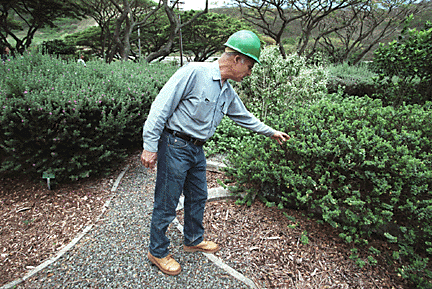


Finding the beauty
in ‘unthirsty’ gardens
The Board of Water Supply
By Stan Constantino
is promoting xeriscapes that use
rare native plants
Star-BulletinAlan Yamashita stood under the burning sun at the Halawa Xeriscape Garden and thought about the type of garden that would match his new Aiea home.
"Xeriscaping is the way to go," Yamashita decided. "People need to take a look at that. It's low maintenance and you use less water. At the same time, you get the beauty of xeriscaping if it's done right."
Since opening in 1989, the Halawa garden has drawn many like Yamashita to its classes and garden tours, where they learn about the drought-tolerant, low-maintenance gardening concept.
In an effort to promote xeriscaping and conservation, the Board of Water Supply on Saturday will hold its 10th annual Unthirsty Plant Sale at the garden, located at 99-1268 Iwaena St.
The garden, wedged tight against the H-3 freeway, serves as a model of the "newest tool developed in recent years, the concept of xeriscaping -- water conservation in the landscape," according to the board.
The term "xeriscaping," from the Greek word "xeros" for dry, comes from the American Southwest and describes an "innovative and creative means" of conserving water.
Yamashita and Earlaina Sampson of Waipahu, both of whom have taken the class and tour, agree on the beauty of xeriscape gardens.
"The garden was very nice and the class was very informative. It gave a lot of information," Sampson said. "By taking the class and going to the garden, it gives you ideas on what you can do with your own garden. At least you can see the flowers up close."
About half the water used in the average family home is used outside, water officials say. By xeriscaping, outdoor water use can be reduced by as much as 80 percent, said Arthur Aiu, a community relations specialist with the board.
"Water conservation is important because it is estimated between 2010 and 2015, the demand for water will be more than what's supplied," Aiu said.
The board on Saturday, for the first time, will distribute seeds from rare and endangered native Hawaiian plants free to the public in partnership with plant expert Keith Robinson of Kauai.
The seeds are for ko'oloa'ula (abutilon menziesil), popolo (solanum sandwicensis), naio (myoporum sandwicensis) and delissea rhytidosperma.
Robinson said he is participating in the seed distribution program because he feels that endangered plants in the wild are unlikely to survive indefinitely, due to the introduced organisms he believes eventually will destroy them.
For more information on xeriscape classes, tours or seed distribution, call 527-6113. Public tours are free. There is a $2 registration fee for the one-day "How to Xeriscape" class, given monthly.